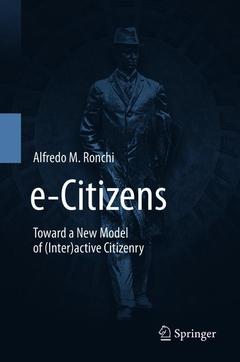Description
e-Citizens, 1st ed. 2019
Toward a New Model of (Inter)active Citizenry
Language: English
Subject for e-Citizens:
Publication date: 03-2019
197 p. · 15.5x23.5 cm · Hardback
197 p. · 15.5x23.5 cm · Hardback
Description
/li>Contents
/li>Biography
/li>Comment
/li>
This book explores a society currently being transformed by the influence of advanced information technology, and provides insights into the main technological and human issues and a holistic approach to inclusion, security, safety and, last but not least, privacy and freedom of expression. Its main aim is to bridge the gap between technological solutions, their successful implementation, and the fruitful utilization of the main set of e-Services offered by governments, private institutions, and commercial companies.
Today, various parameters actively influence e-Services? success or failure: cultural aspects, organisational issues, bureaucracy and workflow, infrastructure and technology in general, user habits, literacy, capacity or merely interaction design. The purpose of this book is to help in outlining and understanding a realistic scenario of what we can term e-Citizenry. It identifies today?s citizen, who is surrounded by an abundance of digital services, as an ?e-Citizen? and explores the transition from their traditional role and behaviour to new ones. The respective chapters presented here will lay the foundation of the technological and social environment in which this societal transition takes place.
With its balanced humanistic and technological approach, the book mainly targets public authorities, decision-makers, stakeholders, solution developers, and graduate students.
1 Being Human in the Digital Age.- 2 Netizens, Communities, e-Citizens Being Human in the Digital Age.- 3 Wellbeing in the Digital Age.- 4 Safety and Security.- 5 Technologies and Privacy.- 6 Interaction Design essentials.- 7 Internet Governance.
Alfredo M. Ronchi is a Professor at the Politecnico di Milano, Secretary General and Head Representative of the MEDICI Foundation at ITU headquarters in Geneva and UNESCO IFAP, Director of the JRC S2D2 (Safety & Security), and former main representative of OCCAM at the United Nations Headquarters in Geneva (1999-2016). He is a member emeritus of the WSA Board of Directors and President of eContentAwardItaly, member of the Scientific Committee of Global Forum (F-USA), Sacred World Foundation (India), Fondazione Nuove Comunicazioni (Italy) and coordinator of several international projects. He has collaborated with the Council of Europe, the World Bank, UNESCO, Austrian Ministry of Culture, Finnish Ministry of Culture, Italian Ministry for Foreign Affairs (Culture Counts, Florence ‘99), and the Municipality of Christiansand (Norway). He has published more than 400 papers and books on e-Culture, e-Government, e-Learning (and other e-Services), and has been a (co-)organizer andprogramme chair for international conferences and workshops run by W3C, the ACM and IEEE.
Presents a balanced humanistic and technological view of a society currently being transformed by the influence of advanced information technology Defines the term e-Citizen and these citizens’ transition from traditional social roles and behaviours to new or adapted ones Provides a holistic approach to inclusion, security, safety and, last but not least, privacy and freedom of expression Outlines the importance of interaction design and Internet governance
© 2024 LAVOISIER S.A.S.

